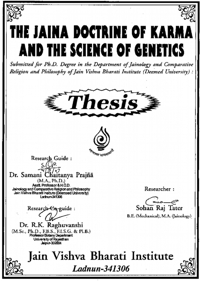Unwholesome karma is pāpa. Goutama Swāmī asked Lord Mahāvīra "Bhañte! How can one be free from pāpa? Lord Mahāvīra replied "there are three ways to get freed from pāpa:
- Knowledge of previous lives.
- Knowledge behind the cycle of birth and death.
- Knowledge of conscious mind (cītta) and how to purify it?
(2) Knowledge of mystery behind the cycle of birth and deathIf one remembers what happened in his previous lives. He will automatically take the path of puṇya and will abandon the path of pāpa. If we don't take the knowledge of our previous lives, it is difficult to abandon the wrong path. The person with the knowledge of previous life, understands the mystery behind attaining the human life. He understands that it requires a great amount of spiritual efforts to attain the human life. He thinks "I don't want to waste my human life by indulging in wrong activities. I need to choice the right path. Knowledge of previous life is called "Jāti smaraṇa Jñāna".
(3) Knowledge of conscious mind and how to purify it?One will become very careful, if he finds out the cause for cycle of birth and death. He is reborn in a good state because of his own good or bad karma. He realizes "my karma is the reason why I am trapped in the cycle of birth and death". The realization makes one to stop undesirable activities and makes him conscious of the importance of human life.
If one figures out why his conscious mind has become impure, and how he can purify it then automatically he begins to free himself from the sinful activities. Unnecessary and sinful activities stain the citta, while practicing as per true religion purities it.
- Praṇātipāta (violence or hiṁsā)
- Mṛaṣāvāda (to tell a lie)
- Adttādāna (stealing)
- Maithuna (unchastity or engaging in sensuous pleasures)
- Parigraha (possessiveness or over collection of worldly things)
- Krodha (anger)
- Māna (ego)
- Māyā (deceit)
- Lobha (greed)
- Rāga (attachment)
- Dveṣa (aversion)
- Kalaha (dispute or quarrel)
- Abhyākhyān (accusation or incrimination)
- Paiśūnya (columny or slandering)
- Para-parivāda (criticize some one in his presence)
- Rati-arati (not to pursue permanent happiness through self restraint and to pursue temporary happiness)
- Māyā-mraṣā (line with the intent of cheating)
- Mithyātva Śalya (false faith or trust).
There are eighteen causes of pāpa as follow:
 Prof. Dr. Sohan Raj Tater
Prof. Dr. Sohan Raj Tater
 Doctoral Thesis, JVBU
Doctoral Thesis, JVBU